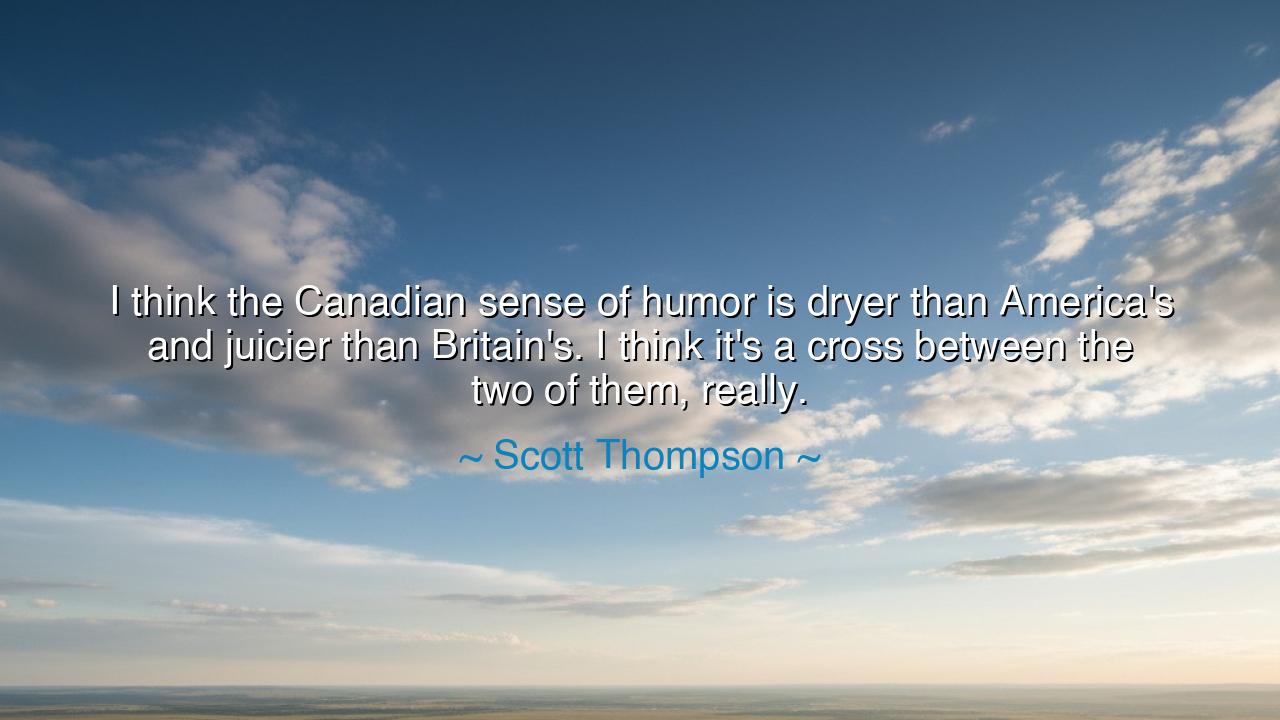
I think the Canadian sense of humor is dryer than America's and
I think the Canadian sense of humor is dryer than America's and juicier than Britain's. I think it's a cross between the two of them, really.






The words “I think the Canadian sense of humor is dryer than America’s and juicier than Britain’s. I think it’s a cross between the two of them, really” by Scott Thompson may seem lighthearted, yet within them lies a meditation on culture, identity, and the subtle alchemy of laughter that binds nations together. Humor, as the ancients understood of wit and irony, is never merely jest — it is the soul’s language, the mirror through which a people reveals its truth. In speaking of the Canadian sense of humor as “a cross between the two”, Thompson does not merely describe comedic style; he describes a people born of contrast — shaped by vast wilderness and modern cities, politeness and rebellion, restraint and mischief.
To call humor “dry” is to speak of subtlety — of laughter that hides behind understatement, that whispers where others shout. This dryness, inherited from Britain, is the humor of irony, of self-control, of finding absurdity in the very act of decorum. It is the humor that laughs not at others but at oneself, that smiles quietly at life’s contradictions. And yet Thompson calls the Canadian humor “juicier than Britain’s” — suggesting warmth, empathy, and an earthy sincerity that softens the British chill. Here, the Canadian spirit emerges — kind-hearted yet sharp, modest yet alive with depth.
In contrast, American humor, bold and exuberant, reflects a nation of pioneers and dreamers — confident, unfiltered, and passionate. It is the humor of the stage and the street, born from freedom and energy, from the belief that all can be said and all can be laughed at. Canadian humor stands between these two worlds like a bridge: it borrows the irony of the Old World and the courage of the New, balancing reflection with playfulness. It laughs not too loudly, but never too softly; it mocks authority, but rarely without kindness.
One might see this balance embodied in Norm Macdonald, the great Canadian comedian, whose humor was as dry as the northern wind yet as rich as the soil of his homeland. His jokes unfolded slowly, revealing wisdom beneath absurdity, cruelty tempered by compassion. He was neither wholly British nor wholly American — but something distinct: a soul shaped by the in-between, where silence is as powerful as the punchline. Thompson’s observation, though humorous in itself, thus captures a deeper truth — that the Canadian temperament thrives in duality, born of both heritage and humility.
To speak of humor in such terms is to speak of survival. For nations, like individuals, develop their humor in response to struggle. The British refined wit amid empire and austerity; the Americans forged laughter in chaos and confidence; the Canadians found theirs in endurance — in long winters, vast distances, and quiet coexistence with difference. Their humor became a form of resilience: soft enough to soothe, sharp enough to reveal. Thompson’s description of this humor as both “dry” and “juicy” is more than metaphor — it is a philosophy of balance, the union of intellect and heart.
Consider the ancient storytellers, who understood that laughter was medicine. The Greek dramatists, like Aristophanes, used comedy not to mock the weak, but to awaken the strong — to speak truth where truth was forbidden. So too does humor function in culture: it binds, teaches, and heals. In Canada, where identities intersect and histories overlap, humor becomes a unifying force — a way to acknowledge absurdity without bitterness, to hold pain and joy in the same breath.
Thus, the lesson of Scott Thompson’s words is not only cultural but universal: great humor arises from balance. It is the harmony between sharpness and gentleness, intellect and feeling, irony and empathy. To cultivate such humor is to cultivate wisdom itself — to see the world clearly, yet not despair; to laugh at its flaws, yet not scorn. So, let us learn from this Canadian alchemy of laughter: be dry enough to perceive truth, but juicy enough to keep the heart alive. For in that sacred middle ground — where irony meets compassion — there lies not only comedy, but the very essence of what it means to be human.






AAdministratorAdministrator
Welcome, honored guests. Please leave a comment, we will respond soon